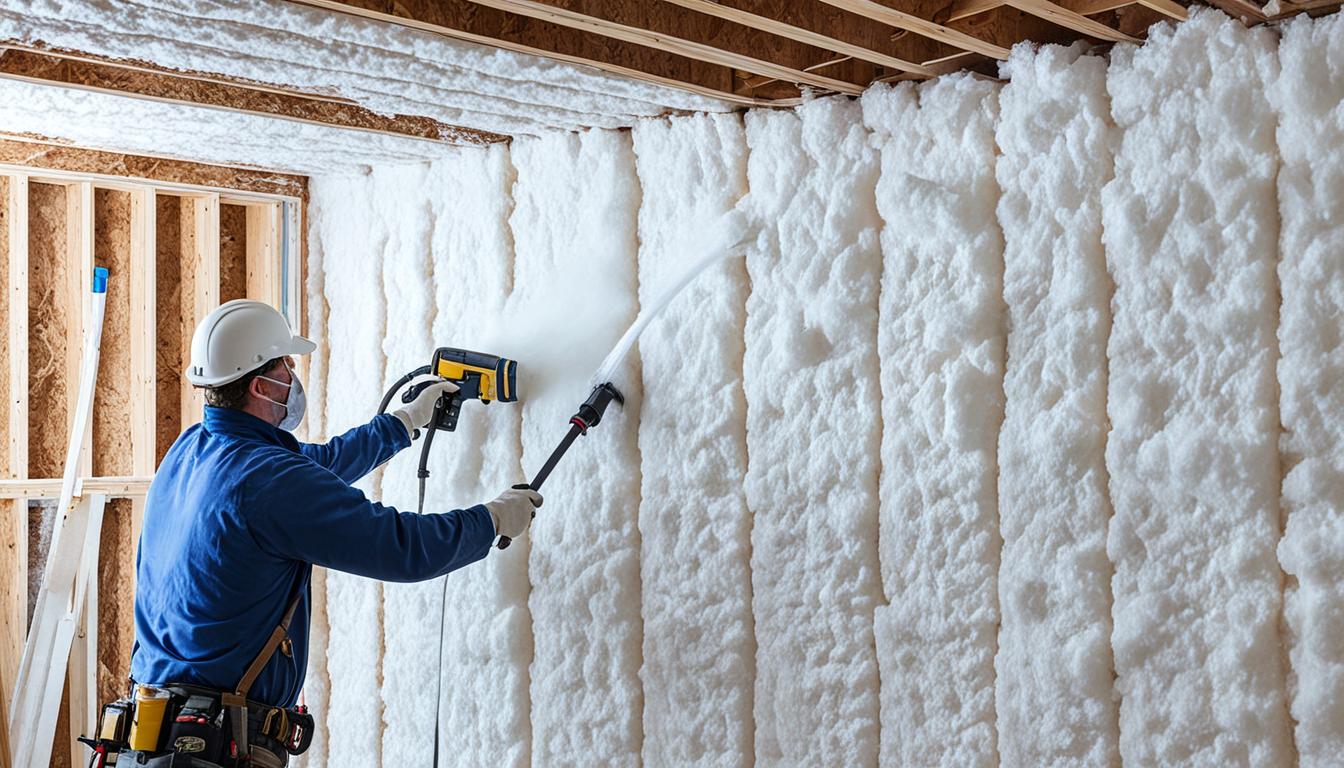Is it a Good Idea to Spray Foam Insulation? 2024

When it comes to insulating your home, there are countless options available. But have you ever considered spray foam insulation? It may seem unconventional, but this insulation method has recently gained popularity. So, is it a good idea to spray foam insulation? Let's explore the pros and cons, benefits, and cost considerations to find out if it's the right choice for you.
Key Takeaways:
- Understand the pros and cons of spray foam insulation
- Discover the potential benefits for your home
- Weigh the cost considerations
- Explore how spray foam insulation compares to traditional methods
- Learn about the DIY options and the importance of choosing a reputable contractor
Understanding Spray Foam Insulation
Spray foam insulation is a popular choice for insulating your home and offers many advantages. In this section, we'll examine spray foam insulation, compare it to traditional insulation methods, and provide you with the best practices for a successful installation. We'll also discuss the top brands in the market and offer guidance on choosing the right spray foam insulation contractor.
Read more: best spray foam insulation
Spray Foam Insulation vs. Traditional Insulation
One key difference between spray foam insulation and traditional insulation methods is the application process. Unlike fiberglass batts or cellulose insulation, which require manual installation, spray foam insulation is applied as a liquid that expands, filling any gaps or voids in your walls, floors, or ceilings. This property of spray foam insulation creates an airtight seal, preventing drafts and heat loss.
Furthermore, spray foam insulation has a higher R-value than traditional insulation materials. This means it provides better thermal insulation, reducing energy consumption and enhancing your home's overall energy efficiency.
Read More: spray foam insulation vs fiberglass insulation cost
Best Practices for Spray Foam Insulation Installation
While spray foam insulation can be a DIY project, following proper installation techniques is essential to ensure optimal results. Here are some best practices to keep in mind:
- Wear protective gear, gloves, goggles, and respirators when handling spray foam insulation.
- Prepare the surface by cleaning it of any debris or dust.
- Properly mix the spray foam components according to the manufacturer's instructions.
- Apply the spray foam insulation evenly and at the recommended thickness.
- Allow the insulation to cure fully before proceeding with additional construction or coverings.
Read More: How to Install Spray Foam Insulation? Step by Step Guide
Choosing a Spray Foam Insulation Contractor
If you prefer to hire a professional for your spray foam insulation project, choosing a reliable and experienced contractor is crucial. Consider the following factors when selecting a spray foam insulation contractor:
- Check their credentials and certifications to ensure they are qualified to perform the job.
- Ask for references and read customer reviews to gauge the contractor's reputation.
- Obtain multiple quotes to compare prices and services.
- Inquire about their warranty and after-sales support for peace of mind.
By understanding the differences between spray foam insulation and traditional methods, following best practices during installation, and choosing the right brand and contractor, you can maximize the benefits of spray foam insulation for your home.
|
Benefits of Spray Foam Insulation |
Drawbacks of Traditional Insulation |
|
Provides an air-tight seal, preventing drafts and heat loss. |
May settle over time, creating gaps and reducing insulation effectiveness. |
|
Higher R-value, offering superior thermal insulation. |
Prone to moisture absorption, leading to mold and mildew growth. |
|
Reduces energy consumption, leading to cost savings on heating and cooling. |
Requires careful installation to avoid gaps and thermal bridging. |
Benefits and Considerations of Spray Foam Insulation

When insulating your home, spray foam insulation offers numerous benefits, making it a popular choice among homeowners. Not only does it provide excellent energy efficiency, but it also comes with a range of advantages over traditional insulation methods. Let's explore why spray foam insulation is gaining recognition as one of the best home options.
Read More: Benefits of Spray Foam Insulation
Enhanced Energy Efficiency with Spray Foam Insulation
Spray foam insulation is known for its exceptional energy-saving capabilities. The material creates an airtight seal, preventing heat loss and air leakage, thus reducing the demand for heating and cooling systems. By improving energy efficiency, spray foam insulation can help lower utility bills and provide a more comfortable indoor environment throughout the year.
Advantages of Spray Foam Insulation
Choosing spray foam insulation over traditional methods offers several key advantages. Firstly, spray foam is a versatile material that can conform to any space, filling gaps and cracks to create a seamless barrier against air and moisture infiltration. Additionally, its high R-value provides excellent thermal insulation, keeping your home warm in the winter and cool in the summer.
Unlike fiberglass or cellulose insulation, spray foam is not prone to sagging or settling over time, ensuring long-lasting performance. Furthermore, spray foam insulation can also help reduce noise transmission, making your home quieter and more peaceful.
Cost Considerations of Spray Foam Insulation
While the initial cost of spray foam insulation may be higher than other insulation options, it offers significant long-term savings. The improved energy efficiency can lead to reduced heating and cooling costs, resulting in lower utility bills over time. Additionally, the durability and longevity of spray foam insulation eliminate the need for frequent replacements, saving you money in the long run.
Eco-Friendly Choice
For environmentally conscious homeowners, spray foam insulation is an eco-friendly choice. Its energy-saving properties reduce greenhouse gas emissions, contributing to a greener planet. Additionally, spray foam insulation is free from harmful chemicals such as CFCs and HCFCs, making it a safer and healthier option for your home.
How Does Spray Foam Insulation Work?
Unlike other insulation materials, spray foam insulation is applied as a liquid that expands into a solid foam. Professionals typically install it by spraying liquid foam onto desired surfaces, such as walls, ceilings, and crawl spaces. The foam then expands, filling gaps and creating a seamless air barrier.
Spray Foam Insulation Installation Process
The spray foam insulation installation process involves several steps to ensure optimal results. Here is a general overview of the process:
- Preparation: The area to be insulated is inspected and prepared, ensuring it is clean and free from debris.
- Masking: Areas that should not be covered with foam, such as windows and doors, are masked off to protect them during the spraying process.
- Spraying: The liquid foam is sprayed onto the desired surfaces, expanding to fill gaps and create an airtight seal.
- Curing: The foam cures and solidifies, forming a durable insulation layer.
- Trimming and Finishing: Excess foam is trimmed, and necessary finishing touches are made to ensure a neat appearance.
Hiring a professional spray foam insulation contractor, like VB Insulation, is essential for proper installation and optimal results. Their expertise and experience will ensure that your spray foam insulation is applied correctly and provides the maximum benefits for your home.
|
Spray Foam Insulation |
Traditional Insulation |
|
Superior energy efficiency |
May have air and moisture leakage |
|
Seamless barrier against air infiltration |
Potential gaps and cracks |
|
Higher upfront cost, but long-term savings |
Lower initial cost, but higher utility bills |
|
Long-lasting performance |
May sag or settle over time |
|
Reduces noise transmission |
Less effective in reducing noise |
|
Eco-friendly and free from harmful chemicals |
Potential use of harmful chemicals |
By considering the benefits and understanding the spray foam insulation installation process, you can make an informed decision for your home's insulation needs. Its energy efficiency, durability, and eco-friendly properties make it an excellent choice for homeowners seeking long-term comfort and savings.
Conclusion: Is it a Good Idea to Spray Foam Insulation?
In conclusion, spray foam insulation offers a range of benefits for homeowners looking to improve energy efficiency and comfort in their homes. Using spray foam insulation helps minimize air leaks and provides excellent insulation, making it an effective choice compared to traditional insulation methods.
One of the key advantages of spray foam insulation is its ability to create a tight seal, preventing air infiltration and reducing energy loss. This helps to maintain a consistent temperature inside the home, leading to lower energy bills and increased energy efficiency.
While spray foam insulation has an initial investment cost, the long-term, cost-effective benefits outweigh the upfront expenses. Proper installation is essential for maximizing its effectiveness, and it is recommended to seek professional spray foam insulation services provided by experienced contractors, such as VB Insulation.
Read More: Is spray foam waterproof?
In addition to energy efficiency and cost savings, spray foam insulation contributes to home improvement by reducing noise transmission, improving indoor air quality, and providing structural strength. It is also an eco-friendly option since it reduces the need for additional fossil fuel consumption and lowers carbon emissions.
When considering whether to choose spray foam insulation, weighing the benefits, cost, and environmental impact is important. Homeowners can learn about the best practices for installing spray foam insulation and conducting a cost analysis to determine long-term savings. Alternatives to spray foam insulation should also be explored to make an informed decision that aligns with unique home improvement needs.
FAQ
Is spray foam insulation a good idea for my home?
Spray foam insulation can be a highly effective option for improving your home's energy efficiency and comfort. It offers advantages such as superior insulation properties, reduced energy bills, and improved air quality. However, it is important to consider factors such as cost, installation process, and potential environmental impact before making a final decision.
What are the pros and cons of spray foam insulation?
The pros of spray foam insulation include excellent insulation properties, energy savings, improved air quality, and moisture control. However, there are a few cons to consider, such as higher upfront costs, potential installation challenges, and the need for professional expertise. It's important to weigh these factors against your specific needs and budget.
How much does spray foam insulation cost?
The cost of spray foam insulation can vary depending on factors such as the size of the area to be insulated, the type and thickness of foam used, and the location. The average cost can range from $1.50 to $3.50 per square foot. Getting quotes from multiple contractors is recommended to get an accurate estimate for your specific project.
What are the benefits of using spray foam insulation over traditional insulation methods?
Spray foam insulation offers several benefits over traditional insulation methods. It provides superior insulation properties, effectively fills gaps and cracks, improves energy efficiency, reduces noise transmission, prevents moisture and mold issues, and increases the lifespan of your HVAC system. These advantages make it an attractive option for many homeowners.
How do I choose the right spray foam insulation contractor?
When choosing a spray foam insulation contractor, consider their experience, certifications, customer reviews, and the quality of their workmanship. Obtaining multiple quotes, asking for references, and ensuring the contractor is properly licensed and insured is recommended. Taking the time to research and choose a reputable contractor can help ensure a successful insulation project.



